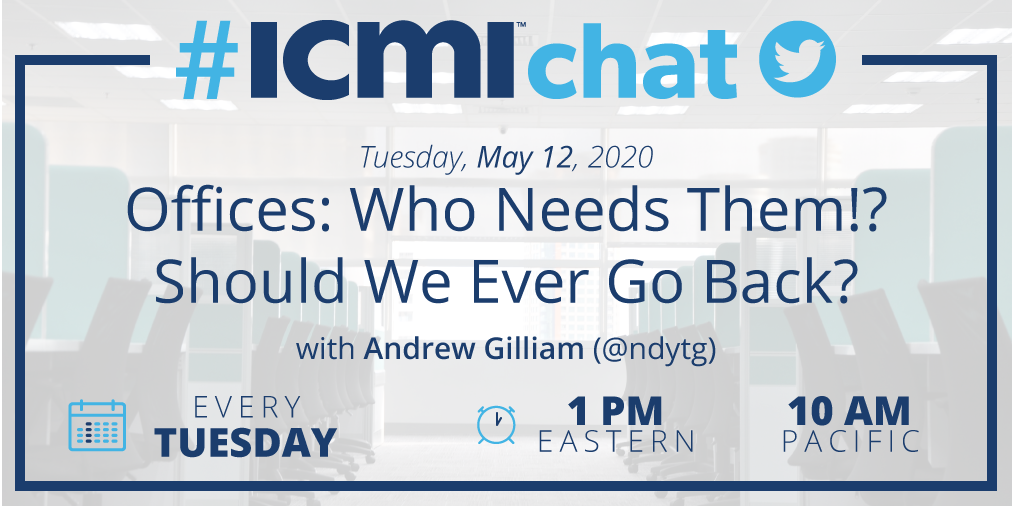By
The Editors
|
Date Published: May 04, 2020 - Last Updated September 08, 2020
|
Comments

Mission. Vision. Values. Every company has them, but not every company's employees genuinely believe in them. Customers see this disconnect between a company and its employees all the time. Customer service representatives make snide remarks about inconvenient policies or lack of empowerment. Managers shirk responsibility when they're too worn down to fight against the status quo.
Join us on Tuesdays at 1 p.m. Eastern, 10 a.m. Pacific to weigh in on the contact center industry's most pressing challenges. Next week, we explore "Offices: Who Needs Them!? Should We Ever Go Back?" A question preview follows this article.
It seems that companies known for being customer experience leaders and great places to work have something in common. They clearly articulate their purpose, and employees appear to buy-in. Instead of being guided by decision trees, employees are guided by a company's values and ethics. In this edition of #ICMIchat, experienced contact center leaders discussed the importance of connecting employees with the company's purpose.
Purpose Is For Everyone
For some organizations, the nature of their business makes having purpose easy. When you work for a food bank or a suicide hotline, of course, the organization is making a difference in peoples' lives. It's less obvious how rescheduling a plane ticket or advising customers which color belt goes with their shirt makes a difference. While they might not be life or death, these missions touch people's lives in different ways, and they're all important.
Every organization, every last one, can have a relatable mission, purpose & vision. When creating these things, it's all about being true to who your organization is at its core, and realistic with how they can deliver this promise to your customers & employees.
Companies of all sizes engage with clients/customers, employees, investors, and the public. A relatable purpose is important. Companies don’t have to be altruistic to communicate they care. A clear mission and list of goals facilitates business at many levels.
Every (for-profit, at least) company has a surface-level mission: "Sell X". A deeper purpose can be found in the answer to "Why is someone's life better if they have X?" When you have that answer, that can guide future efforts, e.g. "What comes next after X?"
Purpose Precedes Productivity
Everyone wants to do work that matters, and younger generations are increasingly concerned with this aspect of employment. When employees know their work matters to someone, they take more pride in their work and are more likely to go the extra mile. It's much easier to do hard work when you know how it helps others.
Working without a mission and purpose is like playing a game without keeping score. You'll do certain rote actions but you will have no motivation to push beyond your limits, nor will you be bothered if things aren't going well.
Yes, indeed, a sense of mission & purpose improves employees’ work quality & productivity just as a lack of mission inhibits even the best employee from doing great work. People need a lasting answer to the question: "How does my work matter in this world?"
If mission is clearly defined & the team knows HOW to achieve it, yes, employee performance, quality, productivity, engagement, satisfaction should fall in line.
Searching For Meaning
Leaders need to connect the dots between their teams' work and the big picture. Don't assume everyone in the organization views their jobs the way you do; remind them why they're so important. Don't forget to personalize your messages, so they resonate with your team.
Lead with purpose. When you are relentless in your pursuit of living your values, others will know there is space for them to do the same. Oh...and asking the team what drives them personally goes along way too.
Mission is only a collection of words unless someone breaks it down to beliefs worth holding. Leaders help employees connect their dots all the way to the big picture. They offer clarity, encouragement, advice, and support at the ground level.
Leaders need to listen to their employees suggestions on ways to improve the service. They have to be willing to make changes based on the constructive feedback. The mission might now change but how you achieve the mission can change over time.
Purpose Promotes Retention
Meaningful work and organizational culture are essential components of employee engagement. If your agents can't find the same purpose at your competitors, they'll be included to stay with your company. Not only does this give your culture and organizational knowledge a boost, but it also reduces your cost to retain and acquire new employees.
Employees draw on their connectedness with the company’s mission especially when times are hard and they are asking "Why am I doing this? Why do I work here?" all the time. If the mission helps them answer these questions, they stay with the company = retention.
People join a company for the purpose. People leave because the mission is not being executed, is not clear or seems unattainable with the approach. A solid mission is "mission critical" to employee retention.
Often attributed to millennials but I think the importance of connectedness to mission is increasingly becoming a differentiator for employers regardless of generation.
The Elusive Cultural Fit
When your mission and vision are clear, it's easier to attract like-minded employees who believe in the organization and its purpose. Hiring managers want to find agents who fit their culture, but most haven't taken the time to figure out what that is. If we're not clear about who we are inside, we can't explain it externally.
Nobody likes working for a company (or a boss) when their *actual* personal mission, goals, and values don't align (even if their *stated* mission and goals do align).
Part of being a purpose-driven business is being clear about values and objectives. Recruiters should attract talent that aligns with the mission to ensure long-term success. A carefully crafted strategic plan for hiring is imperative for retention and engagement.
I don't think the issue is so much hiring people to fit the mission as it is clearly defining and communicating that mission. Most normal people will work for a compelling mission if they know what it is and see it clearly and consistently demonstrated.
Everyone Makes a Difference
Many organizations share some form of financial performance data with their employees. We asked #ICMIchat if agents find this practice insightful or stressful, and we got mixed answers. One thing is for sure; this data must be presented in the right way to drive the behaviors that move the company closer to its goals.
Power of One. Nothing more powerful.
I think it's a disservice not to. They are the ones who often create the most innovative solutions and then drive profit for the organization!
I don't believe one employee can make a difference to the company's bottom line. It takes a workforce all moving together in the same direction, to deliver on the mission.
It totally depends what stake employees have in that financial success. If owners simply say, "Thanks for helping me get richer" that could backfire.
Reinforcing Your Culture
Culture is not a mousetrap; you can't put it in the corner and forget about it. Leaders must continuously model the behavior they expect and talk about the culture they seek for the organization. Top companies built their culture slowly over time. There are no shortcuts in this vital process.
1:1s and team meetings should include discussions about how to interpret values and mission in practical ways, recognition when employees demonstrate them, and in-depth discussions about what they mean.
I’d say whenever there is a milestone or a setback. A milestone reinforces people’s belief in the direction they’re taking towards their mission. A setback gives pause to clarify beliefs internally and course-correct in context!
If you're a leader, especially in the CSuite, don't focus on broadcasting it to your entire org. Just focus on instilling it to your direct reports and ensure they carry it forward. They become vessels.
Executive Support
Senior leadership must guide the culture and demonstrate the behaviors they hope to see in their organization. Culture is a hot topic, and many speak about it without practicing it. For employees to buy-in and commit themselves to the company's success, executives must make decisions based on the same values.
Every moment of every work day, we should be reinforcing the mission & values in our behavior. Lead by example, behave as you expect your employees to behave.
Best case, the mission permeates the ENTIRE organization starting at the top. But sometimes contact center leaders have to lead the charge because they are closer to the customer. This is where CX roles can help bridge the gap.
Hierarchy doesn't mix well with Mission and purpose. If they do it looks like ivory towers and corporate rhetoric. Mission and purpose need to form part of the culture and language of a company so it is at all levels.
#ICMIchat May 12, 2020
Offices: Who Needs Them!? Should We Ever Go Back?

Q1: When it comes to remote work, what has your team struggled with the most?
Q2: Are some teams more suited to remote work than others? What attributes should be considered?
Q3: What processes, methodologies, or management disciplines must be in place to help remote teams to be successful?
Q4: What is the most difficult part of leading a remote team or running a remote contact center? What’s the best part?
Q5: How has working from home affected culture, morale, and turnover? Do your colleagues want to go back?
Q6: Has working from home changed your opinions about remote teams? What have you learned?
Q7: How does working from home affect contact center workforce management?
Q8: Aside from health and sanitation concerns, what should leaders keep in mind if/when transitioning teams back to the office?
Photo by PixaBay from Pexels.